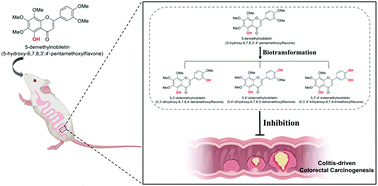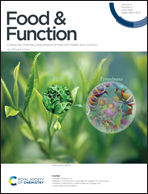The chemopreventive effect of 5-demethylnobiletin, a unique citrus flavonoid, on colitis-driven colorectal carcinogenesis in mice is associated with its colonic metabolites
Abstract
5-Demethylnobiletin (5DN) is a unique flavonoid mainly found in citrus fruits. In this study, we determined the chemopreventive effects of 5DN and its major colonic metabolites on both a colitis-driven colon carcinogenesis mouse model and a human colon cancer cell model. In azoxymethane/dextran sulfate sodium-treated mice, dietary 5DN (0.05% w/w in the diet) significantly decreased the tumor incidence, multiplicity and burden, and showed potent anti-proliferative, proapoptotic, and anti-inflammatory activities in mouse colon tissue. Three major metabolites of 5DN, named 5,3′-didemethylnobiletin (M1), 5,4′-didemethylnobiletin (M2) and 5,3′,4′-tridemethylnobiletin (M3), were found in the colonic mucosa of 5DN-treated mice, and the combined level of these metabolites in mouse colonic mucosa was 1.56-fold higher than that of 5DN. Cell culture studies revealed that 5DN and its colonic metabolites profoundly inhibited the growth of human colon cancer cells by inducing cell cycle arrest, triggering apoptosis and modulating key signaling proteins related to cell proliferation and apoptosis. Importantly, the colonic metabolites, especially M1, showed much stronger effects than those produced by 5DN itself. Overall, our results demonstrated that dietary 5DN significantly inhibited colitis-driven colon carcinogenesis in mice, and this chemopreventive effect was associated with its metabolites in the colon.

- This article is part of the themed collection: Food & Function Recent HOT articles


 Please wait while we load your content...
Please wait while we load your content...